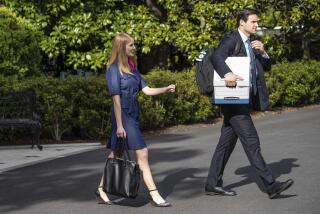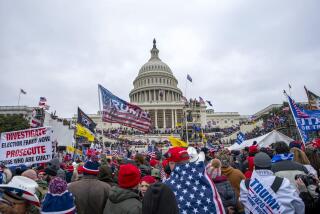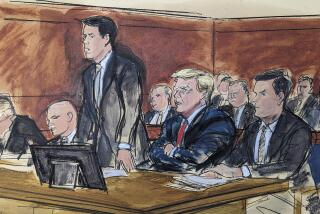Editorial: What we still need to know from James Comey
Former FBI director James B. Comey is scheduled to testify before the Senate Intelligence Committee on Thursday, just one day after President Trump announced the nomination of former Asst. Atty. Gen. Christopher Wray to succeed him.
Comey’s prepared statement for Thursday’s meeting is deeply disturbing — particularly his accounts of how Trump sought to have him drop any investigation of former National Security Advisor Michael Flynn and asked him for a profession of “loyalty.” (Comey says he replied that “you will always get honesty from me.”) Although both the request for leniency for Flynn and the plea for loyalty have been reported in the media, Comey’s confirmation of those accounts is chilling.
Comey’s statement is incomplete, however, on some matters that acquired additional urgency after he was unceremoniously fired by Trump last month — and after the conflicting accounts from the administration about why he was dismissed. (Initially, the White House suggested that Trump acted on the recommendation of Deputy Atty. Gen. Rod Rosenstein, who had found fault with Comey’s investigation of Hillary Clinton’s use of a private email server; later Trump himself acknowledged: “I was going to fire regardless of [Rosenstein’s] recommendation” and that when he made the decision he had “this Russia thing” on his mind.)
Senators particularly need to question Comey about his view of what Trump hoped to achieve in his conversations with Comey, which the FBI director clearly considered inappropriate. He also needs to be asked why, if he regarded the president’s interventions into FBI business as so troublesome, he didn’t immediately sound the alarm with his superiors.
Does Comey now believe that Trump wanted to sideline the larger investigation into possible ties between his campaign and Russia?
As expected, Comey expresses discomfort in his prepared statement with a meeting in the Oval Office on Feb. 14 at which Trump — after dismissing other participants at a meeting — tells Comey that Flynn is “a good guy and has been through a lot” and says, “I hope you can see your way clear to letting this go, to letting Flynn go.”
Comey makes it clear in his statement that he did not agree to “let this go.” And he makes it plain that “I had understood the president to be requesting that we drop any investigation of Flynn in connection with false statements about his conversations with the Russian ambassador in December.” This, he said, was “very concerning.”
That’s an understatement. Yet Comey and his advisors decided not to report on Trump’s request to Atty. Gen. Jeff Sessions or the U.S. attorney who was serving as the acting deputy attorney general. He seems to regard that as “no harm, no foul” because the investigation continued; but senators should press him on whether it was wise not to immediately advise the Justice Department of this “concerning” event. And was it really only “concerning” — or was it an attempt to obstruct justice?
Another ripe subject for questioning is this passage in Comey’s statement about his conversation with Trump on Feb. 14: “I did not understand the president to be talking about the broader investigation into Russia or possible links to his campaign. I could be wrong, but I took him to be focusing on what had just happened with Flynn’s departure and the controversy around his account of his phone calls.”
Yet elsewhere in his statement Comey describes Trump’s anxiety about the burden that larger investigation was creating for him. In a March 30 telephone call, Comey said, Trump told him the Russia investigation was “ ‘a cloud’ that was impairing his ability to act on behalf of the country.” Trump mention the “cloud” again in an April 11 phone call, Comey said, a conversation in which the president reiterated a request that Comey “get out” the information that Trump wasn’t personally being investigated by the FBI. (Comey earlier had given Trump such an assurance privately.)
Does Comey now believe that Trump wanted to sideline the larger investigation into possible ties between his campaign and Russia, which he publicly has dismissed as a “hoax” used by Democrats to explain away his victory over Hillary Clinton? And, if so, does he also believe that that was why he was fired less than four years into his 10-year term?
Congress is entitled to answers to these questions; so are the American people.
Follow the Opinion section on Twitter @latimesopinion and Facebook
More to Read
A cure for the common opinion
Get thought-provoking perspectives with our weekly newsletter.
You may occasionally receive promotional content from the Los Angeles Times.






